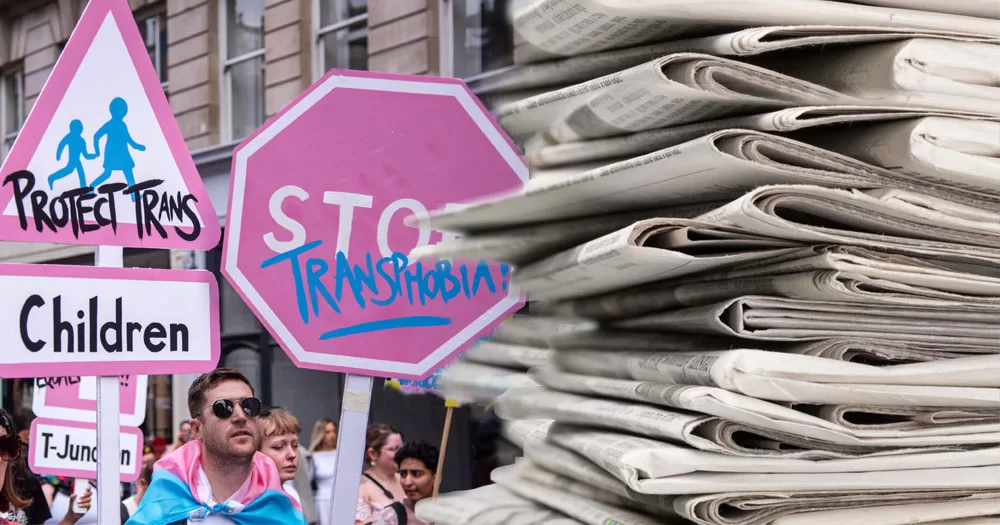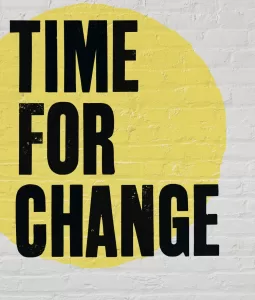The media has a responsibility to be accurate and fair in their reporting, especially when it comes to sensitive issues, but Irish reporting on trans issues is failing us. Brídín Ní Fhearraigh-Joyce explains how many Irish media outlets have failed to uphold this responsibility and have instead perpetuated harmful and inaccurate coverage of transgender issues.
From social media commentary on Enoch Burke’s high-profile court case to Joe Duffy’s RTÉ Radio One programme’s primetime airwaves, transphobic ideology is being shared everywhere. Misinformation and unsubstantiated coverage of transgender issues has dramatically increased at a time when more trans people than ever have come out and become visible.
The Irish media’s coverage of trans issues cannot be described as anything other than negligent, and that includes everything from our national broadcaster to The Irish Times, to Ireland’s highest-selling broadsheet conservative newspaper, the Irish Independent.
With a reported 83% of Irish people accessing the news at least once a day, anti-trans reporting has the potential to influence the general public’s perception of transgender people.
In 2022, Dublin Pride dropped its partnership with RTÉ due to the broadcaster airing “unacceptable, triggering and extremely harmful anti-trans ‘discussions’” across consecutive days on the Radio One Liveline programme.
In a similar move, the Trans Writer’s Union condemned The Irish Times’ editorial stance as one that platforms transphobia. This boycott has seen Trinity College’s University Times cutting ties with The Irish Times printing services in 2022.
For perspective into this recent phenomenon, I asked a trans student journalist, Gale Aitken, for his opinion on current anti-trans media. “News outlets should be concerned with reporting on current events, not platforming hatred,” he stated.
“As a trans person, it’s deeply upsetting to know that every time I open the news online, there will be something on that homepage that debates my existence or demonises me.
“My browser suggests articles to me when I open a new tab, and there’s transphobia there too. It makes it hard to read the news knowing I am going to be faced with views that call into question my right to exist as trans.”
Here are just a few examples of recent articles: ‘The future will condemn us for pandering to the trans agenda’ (Irish Independent), ‘Bill to ban conversion therapy poses problems for therapists’ (The Irish Times), and repeated coverage of a single transgender rapist by The Sunday World newspaper (2022-2023).
To put The Sunday World reports into perspective, in 2021, over 254 people were found guilty of rape in Ireland. To focus solely on a single transgender person’s wrongdoing instead of the disproportionate amount of men who commit violent sexual crimes is blatant transphobia.
Less explicitly transphobic media coverage focuses on issues of trans access to sports, bathrooms, and public health services, with the increase of inclusive language used by the HSE for access to contraception or cervical smear tests being a particularly contentious issue.
To participate in sports is to be a part of a community. To safely use the bathroom is an innate human right. To access public health care is necessary for existence.
According to the survey by the EU Fundamental Rights Agency, 34% of trans people from across all member states of the European Union reported having faced discrimination by healthcare workers based on their gender identity. This is the truth about trans life that these articles neglect.
The overarching theme of these types of pieces reaches the shared conclusion that trans individuals ought to be excluded from public life.
Aitken points to another dimension of the current anti-trans discourse, stating that “the reporting presents trans people as a monolith, and as a threat to society. The hypothetical discussion around these issues, means people are less likely to stop and think about trans people as individuals.”
He continues, “They’re less likely to consider, ‘Do I know any trans people? How are they coping with being the subject of debate?,’ or ‘How would I feel if my existence was being used as a talking point?’ All empathy is lost when the media ignores our voices.”
Many such articles paint trans people as somehow abnormal or deviant. This kind of reporting stigmatises trans people and reinforces harmful stereotypes that contribute to transphobia.
Thankfully, groups are working to combat this onslaught of misinformation and fear-mongering in the media. The Gay and Lesbian Alliance Against Defamation (GLAAD) has published recommendations on the coverage of trans issues.
The organisation recommends that articles about transgender people should be assigned to informed reporters, that conservative opponents of LGBTQ+ equality should be identified as such, that claims about trans people should be fact-checked, and that publications should include trans voices in coverage that mention trans people.
These requirements are not met in the proliferation of mainstream Irish articles that ‘discuss’ transgender people.
Irish publications have repeatedly given opportunities to talk about transgender rights to those who do not belong to the transgender community. Not only this, but some of the journalists behind these articles belong to ultraconservative groups that are considered extremists by The Global Project Against Hate and Extremism (GPAHE).
The GPAHE have named the Iona Institute as one such group. Another group identified by the GPAHE report is the LGB Alliance Ireland.
In an article that was platformed by the Irish Independent in 2020, members of the group stated that “There is a conflict between LGB rights and trans rights”. This type of argument can alienate LGBTQ+ people from each other and sow division among people who face similar oppression.
The truth is that the talking points of these articles provide a distraction from the real issues that affect trans people.
Transgender people face inadequate healthcare access, discrimination, and targeted violence. In 2022, Gardaí reported a 29% increase in reported hate crimes and hate-related incidents in Ireland. LGBTQ+ people were found to be the second most targeted group, after racially motivated hate crimes.
In a study on LGBTQ+ mental health, one young non-binary respondent stated that they “just want to be able to walk down the street with a future partner without being verbally/psychically abused”.
Last year, a report from Transgender Europe found that Ireland has the worst trans healthcare in the European Union. Ireland scored worst on gender-affirming appointment waiting times, with reports that some trans people were waiting on trans-specific healthcare for up to ten years. In most other European states, the wait is less than a year.
Shon Faye, interviewed for Teen Vogue, said that while “there have been some small improvements in press conduct towards trans individuals, such gains have been more than offset by the dramatic rise of another phenomenon: a huge ramping up of press hostility towards trans people as a minority group”.
With the rise of Hollywood actors like Elliot Page and Bella Ramsey coming out, many media outlets report positively on their select individual stories. Yet, trans people as a whole still face othering by the media.
Despite the huge visibility of trans issues in the media, Ireland does not yet collect information on the number of transgender and intersex people among the adult population, with the most recent census lacking any mention of transgender or non-binary identity.
However, it is worth considering that just under 900 people, as of February 2023, have obtained a gender recognition certificate since Ireland’s 2015 gender recognition law passed.
Even while taking into account that not every trans person will obtain a gender recognition certificate, this figure indicates that Irish transgender people make up far less than 1% of the population.
And yet, a cursory search of the word ‘trans’ wields 1,677 different articles on The Irish Times online archive alone. This indicates that there are more transgender articles out there than Irish trans people who have changed their names.
This huge amount of mainstream coverage is completely out of proportion to the number of people who have a real-world stake in trans issues. Instead of taking the opportunity to champion equality, fairness, and unbiased reporting, many outlets favour making trans lives a debate, fuelling culture wars and generating clicks.
The current coverage of anti-trans sentiment distorts the public’s perception of what is newsworthy, shifting the Overton window and thereby making transphobia more permissible in our culture. For a fairer society, transphobic media bias must be stopped.
The article ‘A Matter of Accountability’ originally featured in issue 377 of GCN magazine. You can read the full issue here.
© 2023 GCN (Gay Community News). All rights reserved.
This article was published in the print edition Issue No. 377 (April 1, 2023). Click here to read it now.
Support GCN
GCN is a free, vital resource for Ireland’s LGBTQ+ community since 1988.
GCN is a trading name of National LGBT Federation CLG, a registered charity - Charity Number: 20034580.
GCN relies on the generous support of the community and allies to sustain the crucial work that we do. Producing GCN is costly, and, in an industry which has been hugely impacted by rising costs, we need your support to help sustain and grow this vital resource.
Supporting GCN for as little as €1.99 per month will help us continue our work as Ireland’s free, independent LGBTQ+ media.

